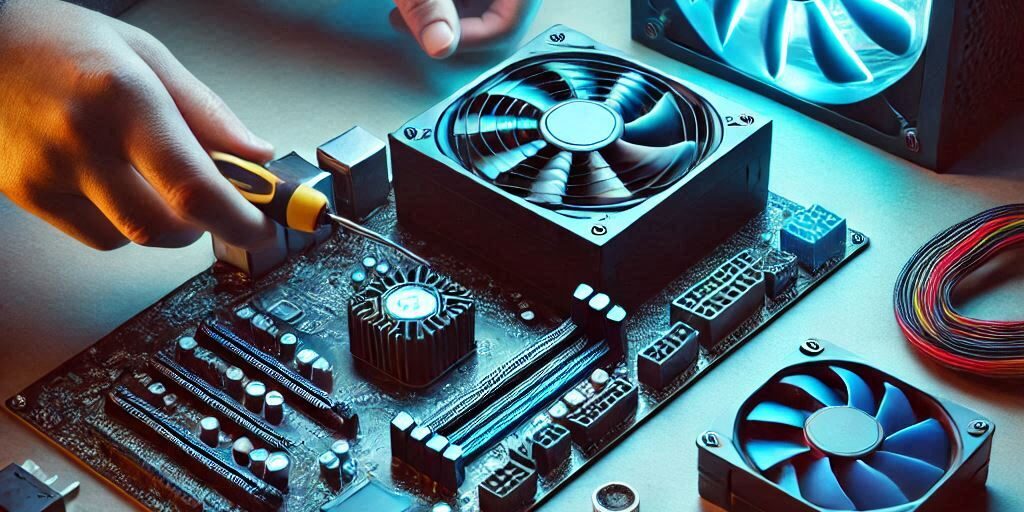Choosing the right power supply for your custom PC is a critical step in the building process. The power supply unit (PSU) serves as the heart of your system, delivering the energy needed to run your components efficiently and reliably. A poor choice can lead to system instability, overheating, or even component failure.
In this guide, we’ll delve into everything you need to know about selecting the perfect PSU for your custom PC. From understanding key specifications to calculating your power needs, this article ensures you make an informed decision.
Why the Right Power Supply Matters
The PSU directly impacts your PC’s:
- Performance: Insufficient power leads to system crashes and throttling.
- Longevity: A reliable PSU protects components from power fluctuations.
- Efficiency: High-efficiency PSUs save energy and reduce heat output.
Understanding Power Supply Basics
1. What is a Power Supply Unit (PSU)?
The PSU converts electricity from your outlet into usable power for your PC components. It also regulates voltage to ensure stability across all hardware.
2. Key Specifications
Wattage
Indicates the maximum power the PSU can deliver. Choose a wattage that comfortably supports your system’s needs.
Efficiency
Measured by the 80 Plus certification, efficiency determines how much power is converted and how much is lost as heat.
Rails
Single-rail vs. multi-rail PSUs affect power distribution. Multi-rail designs are generally safer for high-power systems.
Types of Power Supplies
1. Modular vs. Non-Modular PSUs
Modular Power Supplies
- Allow custom cable management.
- Ideal for reducing clutter and improving airflow.
Non-Modular Power Supplies
- More affordable but include all cables, leading to potential clutter.
2. Form Factors
ATX Power Supplies
Standard size for most PC builds.
SFX Power Supplies
Compact designs for small form factor builds.
How to Calculate Your Power Needs
1. Using a Wattage Calculator
Online tools help estimate power requirements based on your chosen components.
2. Accounting for Future Upgrades
Add a 20–30% buffer to your calculated wattage for future-proofing.
Efficiency Ratings: What You Need to Know
1. 80 Plus Certification Explained
This rating system measures PSU efficiency under different loads.
- 80 Plus Bronze: Budget-friendly, decent efficiency.
- 80 Plus Gold: Balanced for efficiency and cost.
- 80 Plus Platinum and Titanium: Premium efficiency for high-end builds.
2. Benefits of High-Efficiency PSUs
- Lower energy bills.
- Reduced heat generation, improving overall system performance.
Factors to Consider When Choosing a Power Supply
1. Build Purpose
- Gaming PCs: Focus on wattage and GPU needs.
- Workstations: Prioritise stability for multi-core processors.
2. Reliability and Brand Reputation
Trusted brands like Corsair, EVGA, and Seasonic offer reliable options.
3. Noise Levels
Opt for PSUs with silent or semi-passive cooling features.
Common Mistakes to Avoid
1. Undersizing or Oversizing the PSU
Both extremes lead to inefficiency and potential component issues.
2. Ignoring Efficiency Ratings
A low-efficiency PSU wastes energy and generates more heat.
3. Choosing Low-Quality Units
Budget PSUs often lack safety features like overvoltage and short-circuit protection.
Conclusion and Call to Action
Selecting the right power supply ensures your custom PC runs efficiently, reliably, and safely. By understanding your system’s power needs and prioritising quality, you can build a rig that meets both current and future demands.
If you’re unsure about your choice, our team at Perth Computer Experts is here to help. Contact us today for personalised advice and professional assembly services to make your PC build seamless and stress-free!




